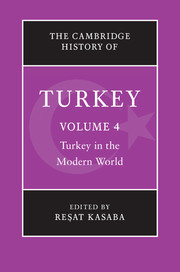4 - The Second Constitutional Period, 1908–1918
from PART I - OTTOMAN BACKGROUND AND TRANSITION
Published online by Cambridge University Press: 28 November 2009
Summary
The Young Turk Revolution of July 1908 inaugurated the Second Constitutional Period, which lasted until the defeat of the Ottoman Empire in 1918. Today the Young Turk Revolution and the decade that followed it are typically regarded as if enclosed in historical brackets, as a sort of transition period from late Ottoman history to the Republican era. Yet to contemporaries, the revolution was a watershed. The revolutionaries themselves counted their achievement among the three great ‘July events’ of modern history: the French Revolution; the American Declaration of Independence; and the Great Ottoman Revolution. We need not accept this verdict, born of a contemporary’s exaggerated sense of self-importance, to recognise that in the interlude between 1908 and the subsequent upheavals in China (1911) and Russia (1917), revolutionaries the world over looked to the Ottomans for inspiration. A century later, we are now in a position to see that the events of 1908–18 had a profound effect on the emergence of the modern Middle East and Balkans. Not only did the repercussions of the revolution transform late Ottoman society, laying the foundations for the Republic of Turkey, they remade the political landscape in an area stretching from Basra on the Persian Gulf to Scutari in Albania not far from the Adriatic.
- Type
- Chapter
- Information
- The Cambridge History of Turkey , pp. 62 - 111Publisher: Cambridge University PressPrint publication year: 2008
References
- 6
- Cited by

